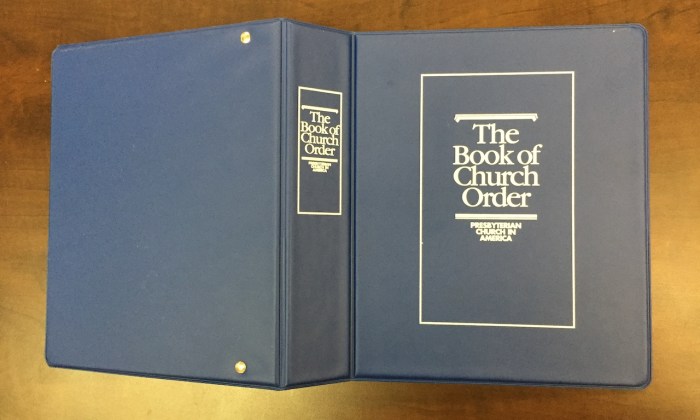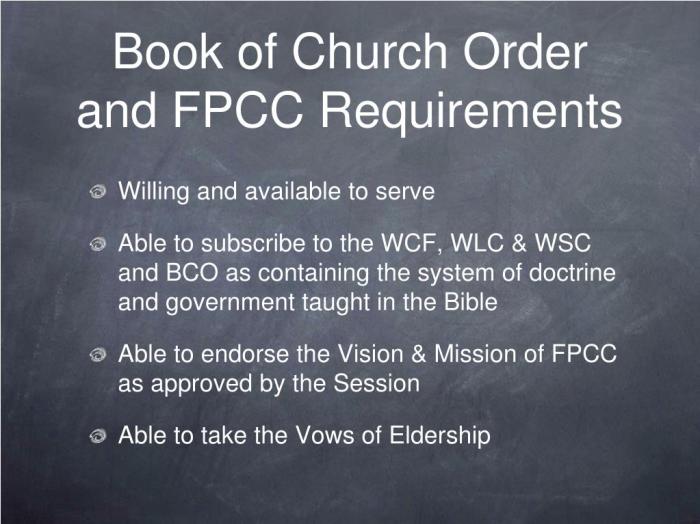The PCA Book of Church Order is the governing document of the Presbyterian Church in America (PCA). It provides a comprehensive framework for the church’s polity, doctrine, and practice. This guide will explore the key principles, history, and practical applications of the PCA Book of Church Order, offering insights into its significance for the PCA and its role in shaping Presbyterian church life.
The PCA Book of Church Order is a rich and complex document that has been shaped by centuries of theological reflection and practical experience. It is a living document that continues to be revised and updated to meet the changing needs of the church.
Overview of the PCA Book of Church Order

The PCA Book of Church Order (BCO) is the official guidebook for the governance and operation of churches within the Presbyterian Church in America (PCA). It provides a comprehensive framework for church polity, worship, and discipline, and serves as a foundational document for the PCA’s understanding of its identity and mission.
The PCA Book of Church Order provides comprehensive guidance for the governance and practice of Presbyterian churches. For those seeking further insights, the em 385 1 1 test answers offer valuable resources. These answers delve into specific aspects of church polity and can complement the understanding gained from the PCA Book of Church Order, fostering a deeper comprehension of Presbyterian principles and practices.
Purpose and Significance, Pca book of church order
The BCO establishes the doctrinal and theological basis for the PCA, outlining the church’s beliefs and practices. It provides guidance on church membership, ordination, and the administration of sacraments. Additionally, the BCO sets forth procedures for resolving disputes and maintaining discipline within the church.
History and Development
The BCO has undergone several revisions since its initial adoption in 1861. The most recent revision was completed in 2019. Each revision has aimed to reflect the changing needs and circumstances of the PCA, while maintaining the core principles of Presbyterian polity.
Structure and Organization
The BCO is divided into three main sections: the Constitution, the Directory for Worship, and the Book of Discipline. The Constitution contains the fundamental principles of the PCA’s polity, including the church’s government, membership, and officers. The Directory for Worship provides guidelines for the conduct of worship services, including the use of liturgy, music, and the sacraments.
The Book of Discipline sets forth procedures for addressing misconduct and resolving disputes within the church.
Key Principles and Doctrines
The PCA’s understanding of church order is rooted in its core principles and doctrines, which provide a framework for its ecclesiastical practices and beliefs.
The PCA holds that the Bible is the sole authority for faith and practice, and its teachings are binding on the church. The church is seen as a visible body of believers, united by the Holy Spirit and called to proclaim the gospel and administer the sacraments.
Authority of Scripture
- The PCA affirms the Bible as the inerrant and infallible Word of God, containing all that is necessary for faith and practice.
- Scripture is the sole authority for determining doctrine, worship, and church order.
Role of the Church
- The church is a visible body of believers, called by God to proclaim the gospel, administer the sacraments, and provide fellowship and support to its members.
- The church is not a building or an institution, but a community of faith united by the Holy Spirit.
Sacraments
- The PCA recognizes two sacraments: baptism and the Lord’s Supper.
- Baptism is a symbol of cleansing from sin and entry into the Christian community.
- The Lord’s Supper is a commemoration of Christ’s death and resurrection, and a means of strengthening the bond between believers.
Church Government and Discipline
- The PCA believes in a representative form of church government, with elders and deacons elected by the congregation.
- Elders are responsible for the spiritual oversight and leadership of the church.
- Deacons are responsible for the practical and administrative needs of the church.
- Church discipline is a process designed to restore wayward members to fellowship and protect the purity of the church.
Practical Applications

The PCA Book of Church Order provides a framework for the practical operation of PCA churches. It guides how churches conduct meetings, handle discipline, and fulfill their various functions.
The Book of Church Order also establishes the roles and responsibilities of church officers, including elders, deacons, and other leaders. These officers play a crucial role in the governance and ministry of the church.
Role of Elders and Deacons
Elders are responsible for the spiritual oversight of the church, including preaching, teaching, and providing pastoral care. Deacons are responsible for the practical and administrative aspects of the church, such as managing finances and overseeing the physical plant.
Both elders and deacons are elected by the congregation and serve for a specified term. They are accountable to the congregation and are expected to fulfill their duties faithfully.
Church Meetings
The PCA Book of Church Order Artikels the procedures for conducting church meetings, including business meetings, worship services, and other gatherings.
Business meetings are typically held on a regular basis to discuss and vote on matters related to the church’s governance and ministry. Worship services are held to worship God and to proclaim the gospel.
Discipline
The PCA Book of Church Order also provides guidelines for handling discipline within the church. Discipline is a process by which the church seeks to restore a member who has sinned to fellowship and to protect the integrity of the church.
The Book of Church Order Artikels the steps involved in the discipline process, including the investigation of charges, the presentation of evidence, and the determination of appropriate consequences.
Comparison with Other Church Orders
The PCA Book of Church Order shares similarities and differences with other church orders, such as the Westminster Confession of Faith and the Baptist Faith and Message. Here’s a comparison:
Westminster Confession of Faith
- Similarities:
- Presbyterian polity with a representative form of government
- Emphasis on the sovereignty of God and the authority of Scripture
- Differences:
- The PCA Book of Church Order is more detailed and specific in its provisions for church government.
- The Westminster Confession of Faith is more comprehensive, covering a wider range of theological topics.
Baptist Faith and Message
- Similarities:
- Congregational polity with each church being autonomous
- Emphasis on the priesthood of all believers
- Differences:
- The PCA Book of Church Order has a more structured and hierarchical form of government.
- The Baptist Faith and Message does not have a formal creed or confession of faith.
Strengths and Weaknesses
Strengths of the PCA Book of Church Order:
- Provides a clear and comprehensive framework for church government.
- Preserves the historic Presbyterian tradition.
- Promotes accountability and oversight within the church.
Weaknesses of the PCA Book of Church Order:
- Can be perceived as too rigid and inflexible.
- May not be suitable for all church contexts.
- Can be difficult to interpret and apply in certain situations.
Current Issues and Debates: Pca Book Of Church Order
The PCA Book of Church Order (BCO) has been a subject of ongoing debate and discussion within the Presbyterian Church in America (PCA). Several key issues have sparked controversy and led to different perspectives among members.
One of the most significant issues revolves around the role of women in the church. The BCO currently prohibits women from serving as ordained ministers, which has been a point of contention for those who believe that women should have equal opportunities for leadership within the church.
Theological Interpretation of Scripture
Another issue of debate is the interpretation of Scripture. Some members of the PCA believe that the Bible should be interpreted literally, while others take a more nuanced approach, allowing for different interpretations and perspectives.
This debate has implications for a range of issues, including the role of women in the church, the nature of marriage, and the relationship between science and faith.
Ecumenical Relations
The PCA’s relationship with other Christian denominations has also been a source of debate. Some members believe that the PCA should maintain a strong separation from other denominations, while others advocate for greater cooperation and ecumenical dialogue.
This debate reflects the tension between the PCA’s commitment to its own distinctive beliefs and its desire to be part of a broader Christian community.
The Impact of These Debates
These debates have the potential to shape the future of the PCA. The outcome of these discussions could determine the PCA’s stance on key theological and social issues, as well as its relationship with other Christian denominations.
It is important for members of the PCA to engage in these debates with humility, respect, and a willingness to listen to different perspectives. Through thoughtful dialogue and prayer, the PCA can navigate these challenges and emerge as a stronger and more vibrant church.
Questions and Answers
What is the purpose of the PCA Book of Church Order?
The PCA Book of Church Order is the governing document of the Presbyterian Church in America (PCA). It provides a comprehensive framework for the church’s polity, doctrine, and practice.
When was the PCA Book of Church Order first published?
The first edition of the PCA Book of Church Order was published in 1861.
Who is responsible for revising the PCA Book of Church Order?
The PCA Book of Church Order is revised by the General Assembly of the PCA.